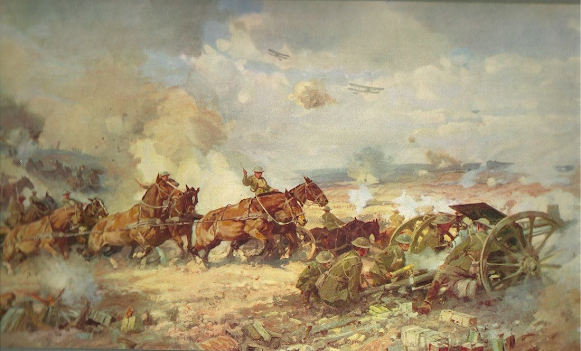The “Great War”, 1914-1918: Democracies and Autocracies
The “Great War”,
1914-1918: Democracies and Autocracies
The “Great War”, 1914-1918, was “the
largest and bloodiest war in human history to that time.” (Snow and Drew 2010).
The war was fought across the globe from the trenches and fields across Europe
to the steppes of Russia, the deserts of the Middle East, and the Atlantic. All
over Europe hundreds of thousands of men and women went to work in factories.
Manufacturing and industry was pressed into service as this war was the first
that included aircraft, submarines, lethal chemicals and machineguns.
The United States in
the late 1890’s had established itself on the international scene as a junior
member of colonial powers, having fought a quick and decisive Spanish-American
War in 1898. ‘Manifest Destiny’ had helped to secure the territories across
North America and the ‘Monroe Doctrine’ assisted with U.S. interests being
secured in the Caribbean and parts of Central America such as Panama, Nicaragua
and as well as Cuba and Puerto Rico.
During the early 1900’s
the United States became the world’s largest industrial power but this did not
necessarily translate to becoming a world power politically nor militarily. In
1914 most “Americans agreed that we should remain aloof from intramural
European struggle” (Snow and Drew 2010) and the U.S. would remain so for
several more years as the war dragged on.
Isolationism and
ignorance to the dynamics of the global economy, further coupled with a lack of
understanding that the war was evolving to be one of democracies fighting
against autocracies kept America’s entrance into the war delayed. The American people were by and large,
immigrants from Europe and “intended to stay
out of a conflict that seemed emblematic of the rottenness of old Europe, a
place from which most Americans were thankful to have escaped.” (Telegraph
2014)
The American public
received information on the war from its Foreign Correspondents and news
outlets. One of Britain’s first acts in 1914 was to cut the underwater
telegraph cables between Britain and the United States. Thus, Americans would
have to rely on information from Britain but the real motive was “an attempt to
target those seen as both sympathetic to Britain and influential in public
debate on the war.” (Cooke 2014)
Many in the United States, however, did
support the U.S. entry into this ‘First World War’. In time the British press
was able to simply the reasons for the war and to what end the Allies were
fighting, namely, the defense of democracy which stood in stark contrast to the
old European Autocracies. The American press reported the sinking of many U.S.
Merchant vessels crossing the Atlantic and it was the sinking of the SS.
Lusitania with the loss of hundreds, to include 129 Americans that began to
change public opinion. In addition, the “revelation of the
‘‘Zimmermann Telegram’’ — a signal intercepted and deciphered by British
intelligence from Germany’s foreign minister to his man in Mexico, offering the
Mexicans the return of territories lost to the US if they joined the war on
Germany’s side — helped generate support for war.” (Telegraph 2014)
The Armistice, signaling the end of the
most bloody war in human history, was very much hoped to be mankind’s last.
Unfortunately, the European powers were in shambles. “The
Versailles Treaty thus, ended up a mish-mash of Wilsonian idealism and
old-fashioned vengefulness.” (Telegraph 2014) The
Germans perceived the loss as embarrassing and the reparations demanded by the
Treaty of Versailles, to be paid by Germany to the rest of Europe, only sowed
the seeds for the next World War.
“President Woodrow Wilson ultimately failed in his
ambitions for a new world order and a credible League of Nations, setting off
much chaos with his insistence on an armistice and his support for undefined
“self-determination.” (Erlanger 2014)
On
the domestic front, President Wilson, once fully committed to war in Europe,
proposed or enacted a multitude of legislation that rationed fuel, affected
price controls and restricted travel. “On April
16, 1917, all males older than 14 who were still “natives, citizens, denizens,
or subjects” of the German Empire became alien enemies.” (McElroy 2002) The
Wilson administration continued to enact or expand measures against “alien
enemies” that ultimately prevented them from work. Organizations that were
deemed “socialist” were also targeted and this included Unions and Worker
Organizations such as the Industrial Workers of the World (IWW). “165 IWW
leaders were arrested in 1917, charges ranged from treason to the use of
intimidation in labor disputes.” (McElroy 2002)
Max Hastings, a prominent and widely
respected military historian has said of the ‘Great War’ that “the supreme irony of 1914 is how many of the rulers of Europe grossly
overestimated military power and grossly underestimated economic power.”
(Erlanger 2014).
- - PRE - -
References
_____________________________________
Snow,
Donald M. and Drew, Dennis M., From Lexington to Baghdad and Beyond War and
Politics in the American Experience, 3rd Edition, M.E. Sharpe, 2010
Telegraph, The, “The War That Launched The American Century”,
Inside the First World War Part Nine, May 2014
Cooke, Ian, “Propaganda in World War I:
Means, Impacts and Legacies”,
Fair Observer, October 2014
The War to End All
Wars? Hardly. But It Did Change Them Forever.” The New York
Times, Europe The Great War, , 2014
McElroy, Wendy, “World War I and
the Suppression of Dissent”, Independent Institute, April 2002
http://www.independent.org/newsroom/article.asp?id=1207









Comments
Post a Comment